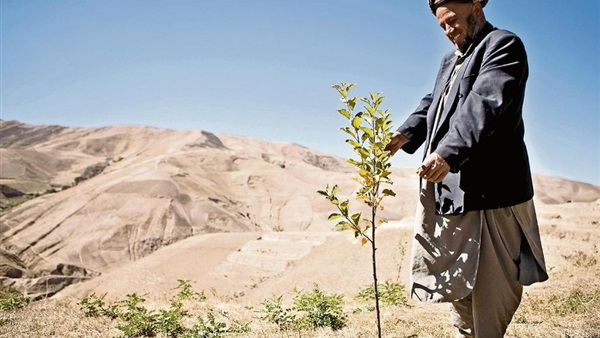Charity saplings will bear fruit in Afghanistan stripped of trees

Tree-planting in Afghanistan can seem like a quixotic idea
in a country racked by unrest and grinding poverty.
Faced with economic hardship since the Taliban’s takeover in
2021, some Afghans have turned to cutting down trees to save money.
“If they have an
apple tree, they still have to pass through the winter. If they don’t have
money to buy food, they will be forced to first cut their own tree. Poverty has
a direct impact on trees,” Guru Naik, deputy director at the Afghanistan
Resilience Consortium, a UN-backed aid organisation, said.
While short-term needs have led to some felling, the
consortium has worked with the charity Afghanaid to plant hundreds of thousands
of trees in recent years.
Afghanaid is one of three charities being supported by The
Times and Sunday Times Christmas Appeal.
Forests cover less than 2 per cent of Afghanistan’s land. After
years of conflict and exploitation by timber mafia and smugglers many of its
conifers have been lost.
Naik and his colleagues are determined to turn the situation
around, to provide people with livelihoods, reduce the risk of flooding and
improve the state of the soil. In the past three years, they have planted more
than 570,640 trees across Afghanistan.
“Most of the
mountains are completely degraded. There are no trees,” Naik said. His
consortium, founded in 2014, has been planting poplars in mountainous areas, to
reduce the flow of water down slopes that causes flash floods and threatens
people downhill.
They also dig terraces to hold water on the mountainsides,
and block gullies with bags of soil.
Poplar is a species usually welcomed by local people as it
is often used for timber, including building houses.
On the flat, which is usually privately-owned land, the
approach has been to plant fruit trees that can help people to earn a living.
“Afghanistan has apple, peach, pear, and they grow very well in the climate.
Those trees can be planted fairly easily,” said Naik. Historically, the country
is also known for pistachio and almond trees.
The trees can provide a significant income via their timber
and fruit. On one jerib, a unit of about half an acre, people can make around
£930 a year from apple trees. For almonds the figure rises to about £1,400 and
pomegranate nearly £1,600, according to Naik.
The consortium does not only plant trees, but also helps to
make them more productive. They worked with one farmer, who lived alone, to
improve his land by building a series of terraces, which turned around a
hundred unproductive apple trees. “Suddenly they started giving him good
fruit,” Naik said. As a result, the farmer fenced them, and built a small house
near the trees where he now lives to take care of them.
Improving the health of trees and planting more is not easy
given the instability in Afghanistan. Providing a steady supply of water can
prove a headache. Saplings require consistent watering in their first years. In
2020, many people were internally displaced by the political crisis. During
their absence, many trees, especially on public land, were not irrigated and
died. “That was our biggest challenge,” Naik said.
When heavy fighting started around January 2021, it took a
while for fieldwork to be affected. But in August that year, “everything
changed” when the Afghan government collapsed in Kabul and the Taliban took
over. “We had to be evacuated,” Naik said.
Afghanaid’s tree-planting and land improvement schemes
restarted before being temporarily suspended once more following a decree
announced by the Taliban on Christmas Eve,which banned women from working for
non-government organisations.
While its operations are suspended, the generous donations
we have already received as part of The Times and Sunday Times appeal will be
held securely in its UK bank accounts.
When the charity feels able to restart operations, the
appeal funds will once again be effectively mobilised and put to use supporting
humanitarian and development work in Afghanistan.







